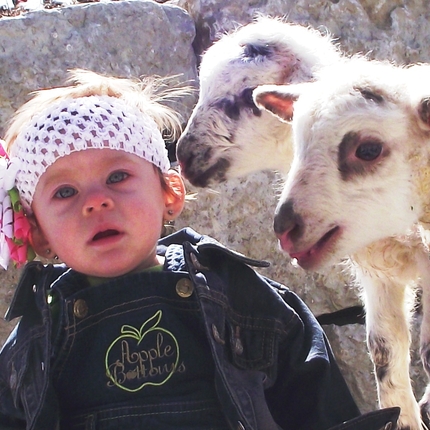Plains states have faced more weather-related catastrophes during seven months in 2019 than entire previous years combined. Flooding has been a major issue for many people, especially residents of Nebraska and Iowa.
Janna Feldman, owner of Doe's and Diva's Dairy, outside of Honey Creek, Iowa, has dealt with this issue firsthand.
Nestled in the Loess Hills of western Iowa, the goat and sheep farm is a small, seasonal, family-run operation. Janna and her family milk 40 sheep during the spring, summer, and fall. And, lambing and kidding occur in the early spring when there are more visitors to the farm.
When flooding hit their area this spring, Janna says everything on their operation stood still. Flood waters washed out all interstates, highways, and gravel roads surrounding their dairy. People were unable to reach their place to attend classes and shop at their farm store.
“We are up in the hills, so we did not have direct flooding, but roads all around us were closed off,” she said. “What was normally a 20-minute trip turned into a two-hour drive.”
Because of this, Janna says her business has suffered financially.
“Spring is usually one of our busiest seasons, and the highest income producing time at the dairy,” she said. “Some roads are open now, but travel is still restricted, and we have only had a handful of visitors to the farm since the flooding.”
The devastation of the flood has not only affected visitors coming to the farm. Feeding the animals of Doe’s and Diva’s Dairy became a huge obstacle as well.
The hills around the dairy endured very hard rains, causing gullies to form and fences to wash out. The animals could not graze on the pasture, as per usual. Janna’s husband, Tom, works full-time off the dairy, so he didn’t have time to fix the problem areas right away. As a result, they had to buy hay to feed the goats and sheep.
But, even that was a difficult task.
“We couldn’t even go get hay, because our sources were gone—they got washed out by the flood,” said Janna. “We had to drive for hours and hours to get hay because all the roads were closed, and we had to take back roads and long routes to get everywhere.”
Though the flooding has taken a toll on their business, Janna shows no signs of giving up hope or slowing down. After working on other operations and being in the dairy business for more than a decade, she knows a thing or two about the recipe for success.
 “Doe’s and Diva’s Dairy has been open for business for six years,” she said. “We attend farmers markets during the summer, and rely on our farm store outlet to sell soaps, lotions, and yarn. We also sell fresh cheese in the store.”
“Doe’s and Diva’s Dairy has been open for business for six years,” she said. “We attend farmers markets during the summer, and rely on our farm store outlet to sell soaps, lotions, and yarn. We also sell fresh cheese in the store.”
Janna also keeps things creative by marketing her animals for nondairy-related activities.
Goats and lambs are available for rent through their “Party Poopers” package, designed for photography sessions, movie filming, parties, graduations, and more. Also offered on-site in the dairy pasture is goat and sheep yoga—a popular form of yoga practiced in the presence of animals, which allows people to interact with them, too.
Doe’s and Diva’s also benefited from a flood grant from the Center for Rural Affairs made possible through Farm Aid. To date, Farm Aid has granted $157,500 to farm organizations in the Midwest and Plains to make emergency grants available to farmers impacted by the historic flooding of 2019.
“Receiving that funding was such a blessing,” said Janna. “When we had no income from the dairy, the Center really helped us out.”
And, though the flooding temporarily slowed down business, Janna keeps planning the next steps for her dairy.
“People see the pictures of flooding, and they automatically think everything is under water, but it’s so much more than people are aware,” she said. “We keep moving forward. We just entered the Iowa State Fair with our cheese, and every year we win some kind of recognition. We’re tough, we’ll keep going and doing the best we can.”






